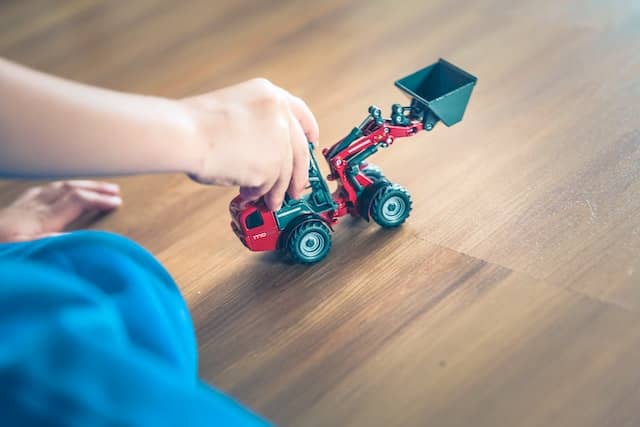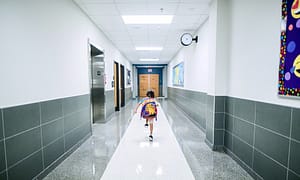
Laurence Rameau, childcare teacher and author of books on early childhood
Learning to deal with your emotions, learning about the physical world and how humans work, that’s what babies do in the nursery.
What The Research Says
Recent research shows that the nursery helps children better manage their emotions and relationships with others because it allows them to build pro-social behavior early, based on empathy.
[1]. Researchers from Inserm, Sorbonne University, and the University of Bordeaux have studied in France the influence of childcare in early childhood on the behavioral and emotional development of children.
The children were followed until they were eight years old, and the researchers regularly measured their relational and emotional behaviors. The study shows that compared to children who do not attend a collective reception mode, those received in a crèche are three times less likely to experience (between 3 and 8 years) emotional problems or encounter relationship difficulties.
The Nursery Is A Chance For Children.
Can we conclude, perhaps a little quickly, that access to a collective type of reception represents an opportunity for children since it is associated with better psychological and emotional development afterward? It is what parents believe empirically and usually indicates when they insist on getting a place in a nursery: “We want our child to socialize in the nursery.” Their idea is to allow their baby to meet other children and learn how to behave with them.
How Do Babies Learn?
Babies learn mainly by trying. They try different ways of approaching and establishing contact with others, creating imitation games, and pursuing common ideas. From the probabilities that a behavior or a reaction will recur, they then identify the reason or cause that produced them. It gradually leads them to understand how human beings work and behave with them.
Babies Don’t Just Learn Social Behaviours In The Nursery.
The professionals are trained and work as a team. It also offers children greater diversity and opportunities to learn. It is proven today by these researchers on pro-social behaviors, also called social cognition, that is to say, understanding how human beings react and communicate. It could also concern other learning: motors, languages, and understanding basic concepts related to objects.
Motor Learning
Babies learn to move and understand the different possibilities of their bodies in space while practicing their manual skills. Installed on the ground, they practice mobility, stimulated by the objects placed at their disposal and reassured by the continual presence of professionals. Their innate curiosity drives them to explore the still-unknown lands of the nursery.
When the organization allows them and the play spaces are open, they are intrigued by the movements of other children and seek to follow them. What pushes them to move and to use their body to overcome obstacles? Thus the nursery is a natural adventure playground, necessarily more extensive than the house.
Language Learning
Babies learn to speak long before they say their first words. They are learning the language all the time they are not yet talking. They do this from what they perceive in their environment, that is to say, the sounds, the movements of the mouth and the words addressed to them, and the language interactions in which they express themselves.
They then select the phonemes and learn sentence syntax and grammar. They collect several vocabulary words. Then they try the sounds and the words, then the sentences. The nursery allows them to live in an environment of language and language interactions with playful media such as books, puppets, picture books, rhymes, and songs.
Learning About Objects
Babies learn about the physical characteristics of objects and materials. By manipulating them in all directions and with all their senses, transporting them, pairing them, or assembling them, they deduce the great concepts of solidity, shape, size, difference, etc. They also seek to understand the possibilities of modifications or selections of objects according to the actions they carry out with them.
All this concrete learning helps prepare the ground for future knowledge that is much more abstract and academic, such as mathematics, physics, or conjugation. They are part of the whole early childhood learning that the nursery offers children through accessibility to animated objects installed in the play areas.
What Is The Added Value Of Nurseries?
Suppose the nursery is now more valued as a learning environment for toddlers. In that case, it is also because the professional teams orient their objectives and skills towards educational projects that aim to promote the development of children. And not just to best meet their basic needs. The added value of crèches is educational but does not necessarily mean explicit preparation for school or conditioning for school organizations.
The Nursery Is Not The Antechamber Of The School.
Toddlers should learn what is natural to know when infants are in an environment where teaching practices are commensurate with their age and learning abilities. For example, it takes time to understand that the other wants the same object and even more time to give it to him. Learning to lend doesn’t happen overnight or just telling the child to do it. It is done when children have the same objects in their hands and thus enter into communication through playful imitation.
After this long phase, the child learns that this object also serves as a means of exchange and can offer it to enter into a relationship and play with the other. Little by little, he learns that the desire of the other is not confused with his own and that he can take this difference into account; this is called the theory of mind. There are so many experiments to do to get there! Nurseries are environments where these many experiences are facilitated by the opportunities linked to the number of children received. However, it would not be a question of requiring children to adopt behaviors incompatible with their development, for example, asking them to follow the rules of a world they do not yet understand. You have to be able to explore the world to understand it.
What Pedagogy At The Nursery?
It is necessary to set up specific pedagogies. What the Koalakids nurseries are doing by adopting the ludic roaming pedagogy ©
[2]. That is to say that the teams set up an organization in which the children can play freely in designed and adapted learning environments. They create different playful universes which all offer children opportunities for exploration and experimentation at the social, motor, language, emotional, and cognitive levels.
The games are concentrated in accompanied playful universes in this organization to help children focus their attention. Children, actors, and especially authors of their games make many positive trials and mistakes that lead them to understand how the world works. Little by little, they consolidate their knowledge, thanks to the adults who secure them and support their commitment.
Learn Vocabulary Words That Start With F
Have you ever requested how to boost your child’s vocabulary? Of course, learning is one of the most significant ways to create language, but there is quiet time & a position for the good of fashioned word lists, especially with young learners. One of the easiest wahttps://yonojnews.com/lifestyle/education/ys to procedure the subject is to walk using the alphabet to introduce new words and thoughts.






